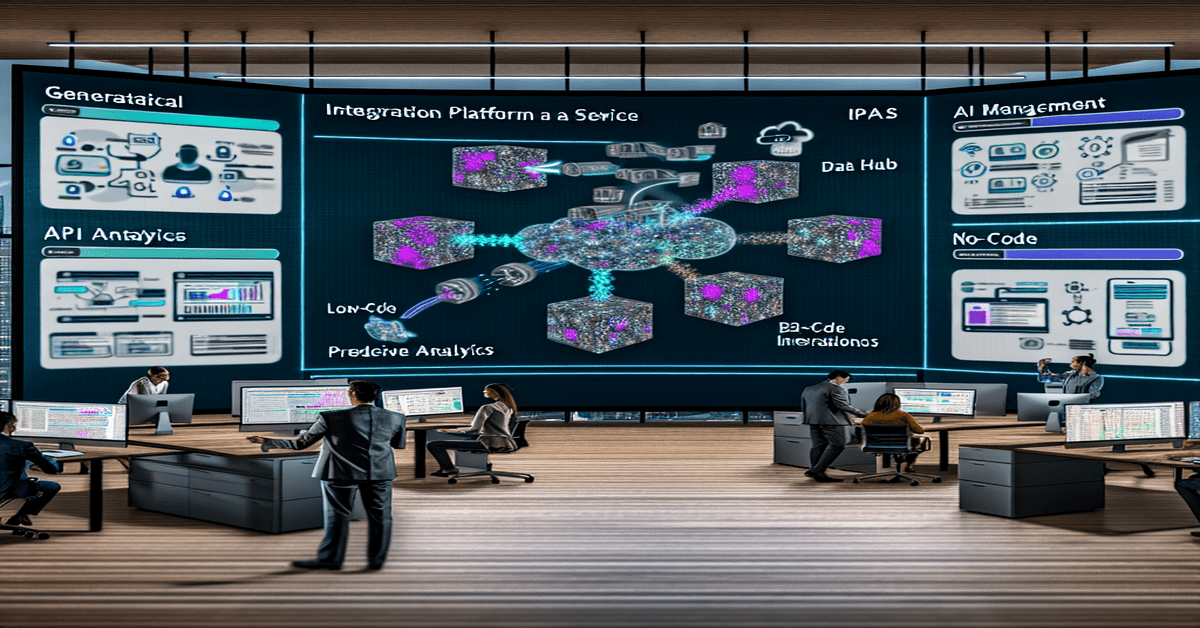The AI Revolution in iPaaS: Embracing the Future of Integration
In the rapidly evolving landscape of digital transformation, Integration Platform as a Service (iPaaS) has emerged as a crucial tool for businesses to streamline their operations and connect disparate systems. However, the integration of Artificial Intelligence (AI) is taking iPaaS to new heights, revolutionizing the way organizations approach automation and data management. As we delve into the fascinating world of AI-driven iPaaS, let’s explore the trends, challenges, and future directions that are shaping this industry.
The Power of AI in iPaaS
AI is no longer a futuristic concept; it’s a reality that is transforming various aspects of our lives, including the realm of iPaaS. By integrating AI capabilities such as generative tools, predictive analytics, and real-time efficiency, iPaaS platforms are becoming more sophisticated and responsive to business needs[1]. This fusion of AI and iPaaS is enabling organizations to unlock new levels of automation, intelligence, and agility.
One of the most exciting developments in this space is the emergence of composable AI integration. Companies like Tray.ai are pioneering this approach, allowing for flexible and modular integration of AI components into business processes[2]. Composable AI redefines traditional automation and iPaaS by making AI central to their operations. This means that businesses can seamlessly incorporate AI-powered functionalities into their workflows, enabling them to make data-driven decisions, automate complex tasks, and optimize their operations in real-time.
The Evolving Landscape of iPaaS
The iPaaS market is undergoing a significant transformation, with various trends shaping its future. From data hubs and API management to B2B integration and workflow automation, the iPaaS landscape is becoming more diverse and comprehensive[4]. As businesses increasingly rely on cloud-based solutions and hybrid integration strategies, the demand for iPaaS is expected to skyrocket in the coming years.
One of the key drivers of this growth is the increasing adoption of iPaaS in sectors such as e-commerce and mobility. As online sales continue to soar and mobile devices become ubiquitous, businesses are turning to iPaaS to seamlessly integrate their systems, streamline their operations, and deliver exceptional customer experiences. The ability to connect disparate applications, data sources, and processes is crucial in today’s fast-paced digital economy, and iPaaS is emerging as the go-to solution for businesses looking to stay ahead of the curve.
The Future of AI-Driven iPaaS
As we look towards the future, the integration of AI in iPaaS is set to become even more profound. By 2025, experts predict that AI integration in SaaS applications will move beyond basic tools like chatbots and predictive analytics, becoming deeply embedded in software processes[5]. This deep AI integration will enable unprecedented levels of personalization, automate complex decision-making processes, and revolutionize user experiences.
Moreover, the rise of low-code and no-code platforms is set to democratize AI-driven iPaaS, empowering non-technical employees to develop customized software applications[3][5]. This shift towards citizen development will accelerate innovation, reduce reliance on IT departments, and enable businesses to rapidly adapt to changing market dynamics.
Navigating the Challenges
While the AI-driven transformation of iPaaS presents immense opportunities, it also poses significant challenges. One of the primary hurdles is the rapid pace of evolution in both iPaaS and AI technologies. Businesses must continuously adapt and innovate their processes and infrastructure to keep up with the latest advancements. This requires a proactive approach to technology adoption, a willingness to experiment, and a culture of continuous learning.
Another challenge lies in the complexity of integrating AI into existing systems. Seamlessly incorporating AI capabilities into iPaaS platforms requires careful planning, expertise, and a deep understanding of both technologies. Organizations must ensure that their AI integrations are scalable, secure, and aligned with their business objectives. Partnering with experienced AI and iPaaS providers can help navigate these complexities and ensure successful implementations.
Embracing the AI-Driven Future
The AI-driven transformation of iPaaS is not a distant dream; it’s a reality that is unfolding before our eyes. As businesses increasingly recognize the immense potential of AI in streamlining integration processes, automating workflows, and unlocking insights, the adoption of AI-powered iPaaS solutions will continue to accelerate.
To stay ahead in this rapidly evolving landscape, organizations must embrace the AI revolution in iPaaS. This involves investing in the right technologies, fostering a culture of innovation, and collaborating with strategic partners who can guide them through the complexities of AI integration.
By leveraging the power of AI in iPaaS, businesses can gain a competitive edge, drive operational efficiency, and deliver exceptional customer experiences. The future of integration is here, and it’s powered by AI. Are you ready to embrace it?
#iPaaS #ArtificialIntelligence #DigitalTransformation
-> Original article and inspiration provided by ReviewAgent.ai
-> Connect with one of our AI Strategists today at ReviewAgent.ai


